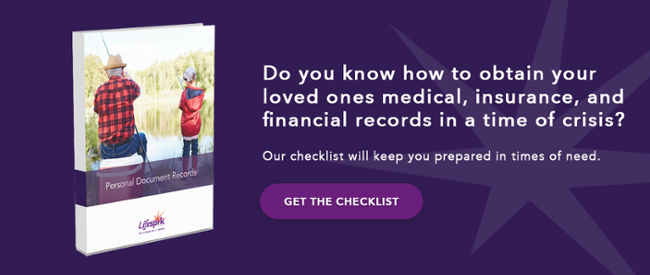
As we increasingly depend on the Internet to store documents and account information, it’s important to centralize things like your loved one’s passwords so you can access their personal information in the event that they are not able to.
Unfortunately, if your loved one has an emergency or becomes very sick suddenly, with no protocol in place it can be incredibly hard to access their personal information to carry out their wishes. While your loved one may have given you verbal permission to access their protected data, this is often not enough to gain access to bank accounts and online services.
“When one of our client’s had a stroke, their family needed access to his medical information including insurance cards, social security card, and veteran ID so that they could get their dad into the best rehab facility quickly,” said Vicki Condon, RN Case Manager for Lifesprk. “Without being able to provide the right documentation, often care can be disrupted and take longer to get what you and your loved one need. When someone’s had a stroke, time is everything when setting them up quickly for long-term success.”
Other personal information such as login passwords, PINs, and access keys are also important to consider. Make sure you and your loved ones have a well thought out plan in place so you can have access to their information if they are no longer able to access it themselves.
Plan in advance
The key to accessing your loved one’s personal information is preparation and pre-planning. If you can, sit down with your loved ones and figure out a list of all pertinent passwords and information needed to access their accounts. Make sure to include the different electronic devices they use on a daily basis like computers, cell phones, and tablets.
Email credentials and bank account information are key pieces of information that shouldn’t be off the list. Ask about passwords as well as verification information banks might request. You should also know how to access online programs like photo storage applications and any other online storage services.
It’s easy to forget about other less used information, but make sure to keep track of loyalty cards, membership numbers, and subscriptions that might need to be canceled to avoid credit card charges.
Any important contact information should also be properly stored, including the locations of any safes, alarms, and safe-deposit boxes your loved one might be using.
When making the list with your loved one, try to be as detailed and meticulous as possible. Put descriptions next to each piece of information so that it is easier to remember what data is needed to access each account. Keep all of these details together in one place so that you’ll be able to easily organize accounts, settle debts, access personal information, and cancel any memberships associated with any of your loved one’s credit cards.
How to store your loved one’s personal information
Password storage services
There are some online services that offer safe and secure storage of personal information and passwords.
This kind of service is however relatively new. Information stored online is often at risk of breaches and hacking, meaning that it may not be the safest option for sensitive data in the long term. Be sure to check the security for the online options and consider downloading secure apps right to your phone to store passwords that are protected.
Split the passwords
Some people prefer to use a password splitting system where one half of a master password is given to a family member such as a spouse and the other half is given to a lawyer. If you’re worried about the possibility of the family member passing away at the same time, they can give their password half to a second lawyer. The big advantage of this system is that one person doesn’t hold the keys to your personal information. However, you might not like the complexity of having multiple people involved in holding your loved one’s passwords and personal information.
Safe at home
Perhaps the simplest solution is to store your loved one’s personal information in a safe at home. Once you have the full details of important passwords and sensitive information, you can keep them in the safe. This method has the advantage of being the easiest solution that also gives you greater control over the information. A trusted family member can hold onto the combination of the safe.
Safe-deposit box
A safe-deposit box might have originally been your go-to option for storing your loved one’s personal information. However using a safe deposit box can result in further complications. Following the passing of a loved one, if any important information is needed from the box, many banks won’t allow access until the box has been probated.
For this reason, while traditionally a popular method for storing loved one’s personal information, it’s not advisable to use a safe deposit box for information and details that you’ll need immediately after a loved one’s death.
Before you think about accessing your loved one’s personal information, it’s important to come up with a comprehensive plan of how you will properly store their digital details and associated information. Once you have gathered all of their personal information and access details, make sure to choose a simple system for keeping all details safe. Once you have an established system in place, both you and your loved ones can relax knowing that information is properly recorded, and a plan is in place.



